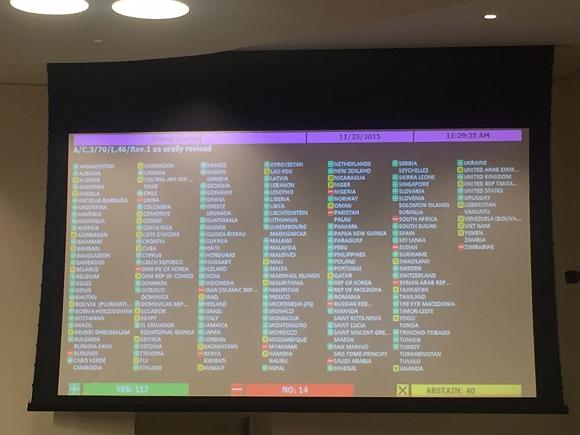– The resolution contains a strong message to the world’s states that they should support and protect human rights defenders. It also addresses business corporations, religious leaders and other influential actors. They should be supportive as well, said Gunnar M. Ekeløve-Slydal, Deputy Secretary General of the Norwegian Helsinki Committee.
– A strong majority of 117 states voted for the resolution. Now is the time for those states that did not support it to reconsider, he added. “Failing to do so when the resolution comes to the UN General Assembly in mid-December will send a strong signal of disrespect of active citizenship.”
The resolution addresses a series of measures that some governments use to undermine and obstruct the work of human rights defenders. They stigmatize them, impose heavy registration and other bureaucratic procedures, initiate unfounded prosecutions and sentence them to long prison terms, and they often fail to make those who commit crimes against them accountable.
Human rights defenders frequently suffer from gross human rights violations, such as disappearances and torture. Women human rights defenders may in many circumstances be particularly vulnerable.
Sometimes state or non-state actors also target the legal representatives of human rights defenders, or their families.
The resolution points to how counter-terrorism measures and measures to preserve national security may “jeopardize the safety of or arbitrarily hinder the work of individuals, groups and organs of society engaged in promoting and defending human rights”.
– The resolution is addressing important issues for human rights defenders not only in repressive countries, but also in open democracies, said Ekeløve-Slydal. – Democratically elected governments need to hear that they should support and consult with human rights defenders who challenge and expose their security measures or their failure to implement economic and social rights.
The resolution puts the struggle for human rights in important contexts, such as conflict prevention, efforts to strengthen peace and development, and resolving environmental and land issues.
– Authorities in a range of countries, which impose particularly unfriendly policies should take notice of the resolution, said Ekeløve-Slydal. “The Russian Federation, Belarus and Azerbaijan are very far from creating a safe and enabling environment for the work of human rights defenders. On the contrary, they treat them as enemies, make efforts to stigmatize them in the eyes of the public, imprison them, and fails to protect them against crimes. In Central Asia, Kyrgyzstan was the only state that supported the resolution.”
According to the Delegation of Norway, which presented the resolution, “it does not create new rights or privileges for human rights defenders. They are entitled to exactly the same rights as all people. However, in light of the pressures that they face, they have a particular need for protection.”
– The resolution says clearly that promoting respect and support for the activities of human rights defenders “is essential to the overall enjoyment of human rights”, said Ekeløve-Slydal. – Human rights defenders, including everybody who engage in peaceful promotion and/or documentation of violations of human rights, are agents for positive change. They advocate open and inclusive societies. They are at the forefront in the struggle for a better future, achieving development goals set by national governments, regional organizations and the UN.
Norway presented the resolution for adoption by consensus. China and Russia, however, asked the Secretariat to put it for a vote, which resulted in 117 “Yes”, 14 “No” and 40 “Abstain”.
– We call upon civil society, national human rights institutions, academic institutions, businesses and media to challenge those governments that failed to support the resolution in the Third Committee, concluded Ekeløve-Slydal. “They need to hear that a failure to support the resolution in the General Assembly will not go unnoticed. That will be seen as an expression of disregard and hostility toward international human rights and those who promote respect for them.”
Overview of the voting:
117 states voted “Yes”:
Afghanistan, Albania, Andorra, Antigua and Barbuda, Argentina, Armenia, Australia, Austria, Bahamas, Bangladesh, Barbados, Belgium, Belize, Benin, Bhutan, Bosnia and Herzegovina, Botswana, Brazil, Bulgaria, Cabo Verde, Canada, Chile, Colombia, Costa Rica, Croatia, Cyprus, Czech Republic, Denmark, Djibouti, Dominican Republic, El Salvador, Estonia, Ethiopia, Finland, France, Gabon, Georgia, Germany, Ghana, Greece, Guatemala, Guinea, Guinea-Bissau, Guyana, Haiti, Honduras, Hungary, Iceland, India, Indonesia, Ireland, Israel, Italy, Jamaica, Japan, Jordan, Kyrgyzstan, Latvia, Lebanon, Lesotho, Liberia, Libya, Liechtenstein, Lithuania, Luxembourg, Malawi, Malaysia, Maldives, Malta, Marshall Islands, Mauritius, Mexico, Micronesia (Federated States of), Monaco, Mongolia, Montenegro, Morocco, Nepal, Netherlands, New Zealand, Norway, Panama, Papua New Guinea, Paraguay, Peru, Philippines, Poland, Portugal, Republic of Korea, Republic of Moldova, Romania, Rwanda, Saint Lucia, Saint Vincent and the Grenadines, San Marino, Senegal, Serbia, Sierra Leone, Singapore, Slovakia, Slovenia, South Sudan, Spain, Sri Lanka, Suriname, Sweden, Thailand, The Former Yugoslav Republic of Macedonia, Timor-Leste, Trinidad and Tobago, Tunisia, Turkey, Ukraine, United Kingdom, United Republic of Tanzania, United States, and Uruguay.
14 states voted “No”:
Burundi, China, Democratic People’s Republic of Korea, Iran, Kenya, Myanmar, Nigeria, Pakistan, Russian Federation, Saudi Arabia, South Africa, Sudan, Syrian Arab Republic, and Zimbabwe.
40 states abstained:
Algeria, Angola, Azerbaijan, Bahrain, Belarus, Bolivia, Brunei Darussalam, Cameroon, Central African Republic, Comoros, Congo, Cote D’Ivoire, Cuba, Democratic Republic of the Congo, Ecuador, Egypt, Eritrea, Fiji, Iraq, Kazakhstan, Kuwait, Lao People’s Democratic Republic, Mali, Mauritania, Mozambique, Namibia, Nicaragua, Niger, Oman, Qatar, Swaziland, Tajikistan, Togo, Uganda, United Arab Emirates, Uzbekistan, Venezuela (Bolivarian Republic of), Viet Nam, and Yemen.
Some states did not take part in the vote:
Burkina Faso, Cambodia, Chad, Dominica, Equatorial Guinea, Gambia, Grenada, Kiribati, Madagascar, Nauru, Palau, Samoa, Saint Kitts and Nevis, Sao Tome and Principe, Seychelles, Solomon Island, Somalia, Tonga, Turkmenistan, Tuvalu, Vanuatu, and Zambia.
